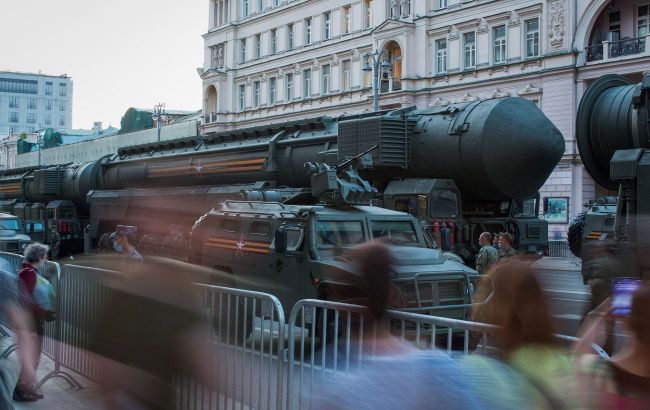Russia fails Yars and Bulava nuclear weapon carrier tests: Ukrainian Intelligence reports
 Yars (Photo: Getty Images)
Yars (Photo: Getty Images)
The Russian Federation conducted unsuccessful tests of the Yars and Bulava missiles, which are carriers of nuclear weapons, according to the Defense Intelligence of the Ministry of Defense of Ukraine.
Yars
"On November 1, 2023, the aggressor state, Russia, conducted unsuccessful tests of the intercontinental ballistic missile RS-24 Yars, which is the mainstay in the ground-based component of the strategic nuclear forces of the Russian Federation," the press service reports.
The launch of Yars was carried out from the Plesetsk Cosmodrome, located in the Arkhangelsk region, with the target at the Kura test range in Kamchatka. According to intelligence data, the missile deviated from its course, just as it did during the previous exercises on October 25, 2023.
Bulava
"Likewise, the test launch from the submarine missile cruiser Borey of the ballistic missile RSM-56 Bulava on October 25, 2023, ended unsuccessfully, confirming its unreliability once again," according to Defense Intelligence.
Sarmat
Moscow also faces problems with the heavy ICBM RS-28 Sarmat of silo-based deployment, which is one of the key projects in the modernization of Russia's strategic nuclear forces.
Sarma has been under development since 2009. Moscow originally planned to introduce it into service in 2018, but the date was repeatedly postponed. Finally, the missile was accepted into service only in September 2023, following its first and only full-scale test in April of the same year.
"Compared to the Ukrainian-manufactured ICBM RS-20 Voyevoda, the Sarmat missile, which is intended to replace it, lacks any advantages in design, payload, or methods of overcoming missile defense. In fact, Sarmat is an unfinished, imperfect, and crude missile," adds Intelligence.
Improvements in air components
Russia also faces difficulties in its plans to enhance the air components of its strategic nuclear forces. As part of the modernization of Tu-160 and Tu-95MS aircraft, the Russians have the capability to refurbish 1-2 aircraft annually.
"The planned delivery of new strategic bombers Tu-160M2 for 2023 has been postponed to a later date, as the Russians have not been able to resume production of the new version of NK-32 engines," the press service notes.
Russia's Withdrawal from the INF Treaty
On March 1, Russia unilaterally informed the United States that it was withdrawing from the Intermediate-Range Nuclear Forces (INF) Treaty. This step was announced by dictator Vladimir Putin.
The goal of the treaty was to have countries reduce the number of nuclear weapons in accordance with mutual commitments. Specifically, the existing agreements involved reducing the number of deployed warheads for each side to 1,550 units and the number of intercontinental ballistic missiles, ballistic missiles on submarines, and heavy bombers to 700 units.

